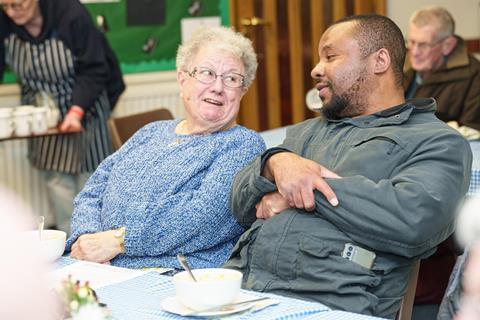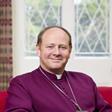At the most recent CofE synod, there was overwhelming support for evangelism and church presence on housing estates. Tackling injustice in this area is key to church growth, says Rt Rev Rob Wickham

For the past six months, as part of my role as CEO of the Church Urban Fund, I have been out and about around the country. I’ve visited projects and, importantly, sat at the feet of many who experience poverty on a daily basis, whose lived experience is very different to mine.
The gospel imperative for working among the poorest in society is obvious. In John’s Gospel alone, God pitches his tent among us (John 1:14), raises Lazarus - who has no voice and never speaks - from the dead (John 11), and tells Peter to “feed my lambs” (John 21:15) - lambs being the most marginalised and vulnerable animals.
This work is not optional for the Church. Time and again, scripture speaks of how material and relational wealth need to be shared, as all are a gift of God in creation.
Evangelistic mission in these contexts is neither an optional extra nor just a pastime for those who have a choice. If the poor are truly blessed by God, then our estates and lowest income communities will be places where the missio dei - or mission of God - is, whether or not this appears on any church strategic plan.
Called to serve
In the CofE ordination liturgies, deacons are called to “serve the community in which they are set, bringing to the Church the needs and hopes of all the people. They are to work with their fellow members in searching out the poor and weak, the sick and lonely and those who are oppressed and powerless, reaching into the forgotten corners of the world that the love of God may be made visible”.
In the areas of greatest deprivation, Church structures are failing the leaders who serve there
These words form the bedrock of ordained ministry - but they are not the exclusive realm of the pioneer or overseer minister. They shape the core for all ministers, ordained or not. This is a calling of all the baptised to work together.
Challenging injustice
From Bristol to Blackburn, Southwell to Southwark, Carlisle to Chelmsford, and across the charity and parachurch sector - the Message, Christians against Poverty, Resurgo, Church Urban Fund and others - a more coherent voice is emerging. We are speaking more explicitly about compassion, service and the need to challenge the unjust structures of society.
Strategies about church growth and revitalisation are becoming more shaped by honest, local conversations. This means asking: What kind of church do we need to be in this place?
A serious reflection will also involve church leaders confronting the injustices of classism and racism that pervade society, and revealing the structural sin in which many are caged. It also becomes clear that such communities have much to teach a Church which is predominantly old and white about how to grow younger, more diverse and more just.
Supporting from within
In the areas of England that suffer greatest deprivation, Church structures are currently failing the leaders who serve there. When appointments are made (after long vacancies) the institution steps back, silently suggesting that you are now on your own. Clergy often work alone, shouldering tasks and responsibilities that colleagues in wealthier areas would consider beneath them.
We speak of challenging unjust structures within society, yet Church financial structures and historical assets serve the wealthy – and our middle-class structures of charity governance exacerbate this problem. It is a far cry from the urban priority areas created some decades ago, when we gladly shared this responsibility.
Gatehring the data
Baroness Scott, Minister for Faith and Communities, is asking faith communities to demonstrate their value added. This is a fair question. So often, we undervalue the impact of encounters with Jesus Christ, especially when we are overstretched.
The CofE collects data on the things we value, yet much of this ignores the life-transforming and community-building missional work that forms the outworking of our prayer and worship. It is cheap, easy and demoralising to simply ask for statistics of Sunday and weekday worshippers. It is harder to assess the value added for the rest of the week.
Church financial structures and historical assets serve the wealthy
Yet, with hard work, we can show how staggering the contribution to wider society this truly is. It may even challenge the image of struggling and toxic institutions, and bring confidence in funding applications.
One church centre in Nuneaton revealed that the Department of Levelling Up, Housing and Communities had assessed their annual value added as being £8.6million. Their work is not exceptional, and their experience is replicated in many communities; we just don’t currently have this data.
Righteous anger
Research from the Joseph Rowntree Foundation reveals that poverty levels have not substantially changed in England since the significant rises seen under Margartet Thatcher’s Conservative government. Today, between 22 and 25 percent of the population continue to live in poverty.
At the same time, the discrepancy between the richest and poorest has grown. Heartbreakingly, the Christian community seems to largely accept this as normal. We have got used to these figures. Our righteous anger has gone and our energies have become more internally focused.
We possibly even collude with what theologian, William Cavanagh, describes as the myth of the state as saviour (Theopolitical Imagination, T&T Clark) and the myth of globalisation as a true form of catholicity. We forget that the Eucharist is the most decentralised political act; our wider agency is discovered in God’s mighty prayer for the world.
In 2025, there will be two significant anniversaries. It will be 1,700 years since the first Council of Nicaea, which brought a coherent unity in doctrine. It will also be 40 years since the publication of the CofE’s Faith in the City report. Produced in response to rising inner city poverty in the UK, it focused our shared righteous anger and pointed the Church towards action.
Together, these are powerful reminders of what is possible. We can inhabit this heavenly vision of being challenged by what is going on in the world around us, and challenging unjust structures of society. And that has the potential to bring us to a place of glorious and unanimous unity.




































1 Reader's comment